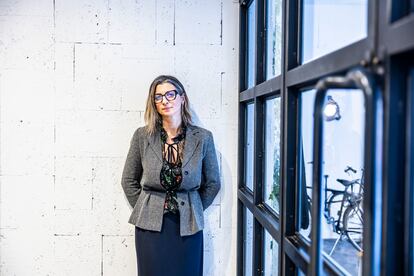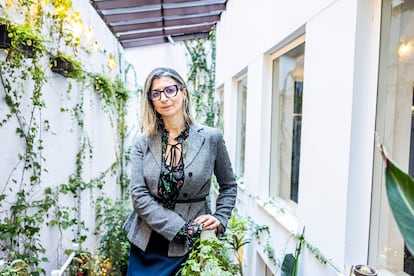Francesca Albanese, UN rapporteur on Palestine: ‘It is highly possible that genocide is unfolding in Gaza’
The United Nations expert on human rights in the occupied Palestinian territories has demanded that Western governments move from condemnation to action


Francesca Albanese is blunt when she describes in no uncertain terms the crimes Israel is committing in Gaza. The Italian lawyer and United Nations Special Rapporteur on the situation of human rights in the Palestinian territories, avoids being categorical when talking about genocide because the International Court of Justice (ICJ) must still “analyze,” the accusation, but all her arguments lead to one conclusion: the war in the Gaza Strip “is the monstrosity of our century,” as she tells EL PAÍS in an interview, sitting on the stairs of a hotel in order to be able to respond without the distraction of background noise. Albanese recently arrived in Spain at the invitation of MEP Manu Pineda, chair of the Delegation for Relations with Palestine in the European Parliament. She believes that the time has come for Western governments to move from condemnation to action.
Question. Do you think Israel is committing genocide in Gaza?
Answer. I strongly support and welcome South Africa’s decision to ask for preventive measures [before the ICJ], because I do think that it’s highly possible that there is a genocide unfolding.
Q. On what grounds?
A. Because a genocide is the destruction of a people totally or in part through various acts of killing, infliction of severe mental or physical pain and the creation of conditions that make life impossible. Look at the results of three months of heavy bombardment. Prohibited weapons, which should not be used in highly populated areas like Gaza, have been used against a population that lives trapped in 365 square kilometers, where the population has received mass evacuation orders and where there are 1.9 million forcibly displaced people crammed into the south of the Gaza Strip being bombed while we speak: 24,000 people have already been confirmed dead, between 7,000 and 9,000 missing and 10,000 kids killed. Seventy percent of the victims are women and children.
Q. Is it then a genocide?
A. These figures are unparalleled, unmatched in any other of the current conflicts. Think of the Srebrenica genocide, where 8,000 people were killed. Think about the two-year war between Russia and Ukraine, which has killed probably 8,000 [civilians, a figure that Ukrainian authorities place at 12,000, without taking into account the occupied territories]. It is the monstrosity of our century. And many more people are going to die due to the lack of medical care for the 60,000 injured. Palestinians are dying of cold and hunger and collectively we have no idea of how to react to this monstrosity clearly.
Q. Do you think South Africa’s lawsuit against Israel will succeed?
A. There are many factors. I technically would say yes because they are asking for provisional measures first and foremost, including a ceasefire. It is the most logical thing with this level of killing. As the South African team said, this is the first genocide in history which is being televised by the victims. The court will have to take its time to analyze the correlation between the genocidal intent, which South Africa has fully documented already, and the killing, the destruction, and the infliction of suffering. But then, of course, there are political factors.
The right to self-defense that Israel has invoked under article 51 of the UN Charter is the right to wage a war, the right to use military force, which, based on ICJ jurisprudence, doesn’t exist, especially because it still occupies Palestinian territory
Q. Do you think this can influence the court?
A. I hope they will not influence the court, which is independent. But, still, we are human beings and it affects us in the environment in which we live. The judges will not go to Gaza, they will not send investigators. And the narrative that continues to be spread and amplified in the West is that this is self-defense.
Q. Is this narrative false?
A. Self-defense is something else, which does not mean that Israel does not have the right to defend itself. This is the tricky part that many people struggle to understand, because the concept of self-defense in international law is very specific, very narrow and very technical. Israel had the right on October 7 to neutralize and repel the attack, to restore law and order, and also to take measures to enforce law and order in Gaza. The right to self-defense that Israel has invoked under article 51 of the U.N. Charter is the right to wage a war, the right to use military force, which, based on ICJ jurisprudence, doesn’t exist, especially because it still occupies Palestinian territory. But even if the right to self-defense existed, there would still be rules. But there are so many violations that you can’t disentangle one from the other.

Q. Can you provide an example?
A. Israel knows that if it uses almost one-ton bombs in densely populated areas without warning, it’s going to cause an extermination. Israel knows that by prohibiting the entry of water, food, medications and fuel, the population is going to starve. A thousand children have been amputated without anesthesia. The principle of proportionality, of precautions, of protecting civilians... Israel has bombed hospitals. And this is why it’s essential to examine the overall context, that was supported by this genocidal fury.
Q. What do you mean?
A. Genocidal statements by political and military leaders, like the Palestinians are inhuman animals. Or the biblical concept of Amalek, which alludes to the destruction of everything, including women and children. It’s an inferno and it’s crazy that we can’t stop it.
Q. Netanyahu has stated that he will not stop until the hostages are freed and Hamas has been annihilated. How can a ceasefire be achieved?

A. I’m very worried for the hostages and the families of the hostages. They cannot be safe in a place that is being bombed. There are hostages who have been shot [by Israeli troops] because they thought they were Palestinians, despite the fact that they were waving a white flag.
The message that Western countries are sending to Israel is that it can continue. And the message that the world is sending to the Palestinians is you can continue to die
Q. What can the international community do then?
A. Western countries are still in the state of mind of condemnation or calling for restraint, of calling for respect for international law. But international law was not respected even before this war. This level of impunity over violence is systemic, it’s structural, creating the risk of generating more violence. There have been decades of condemnation without action. Israel has not paid for any of the five previous wars against Gaza, in which 5,300 people were killed over 16 years, including 1,200 children. That is why the Secretary General [of the U.N., António Guterres] said that October 7 did not start on October 7. You build peace with peace agreements, not war. So for Western governments, including Spain, it’s time for action.
Q. In what way?
A. This is what, in my view, progressive leadership does: having the courage, as South Africa has done. It takes courage, and it takes a strong moral compass, to do the right thing and to be on the right side of history. And what I am saying should not be read as something detrimental to Israelis. I think we need compassion towards both peoples because they have both endured pain in different ways.
Q. There are countries that continue to sell weapons to Israel.
A. For me, this is complicity with a government that is committing crimes. You don’t need to endorse the analysis that this is genocide [to stop selling arms]. Israel has disproportionately destroyed Gaza’s infrastructure, made the Gaza Strip uninhabitable, wiped out entire families, doctors, journalists... If this is not enough to take senior diplomatic, political, and economic measures, what is? The message that Western countries are sending to Israel is that it can continue. And the message that the world is sending to the Palestinians is you can continue to die.
Q. Is the international legal system in danger?
A. Yes, because international law is only as strong as the will of states to enforce it.
Q. You have been accused of antisemitism for claiming that the Jewish lobby controlled the United States. What repercussions has this accusation had for you?
A. Everyone who dares to criticize Israel faces accusations of antisemitism. It’s a way to deflect attention from my message and the work I’ve done for 18 months. I’m not being seriously questioned on my findings or my legal readings, or my claims about the existence of an apartheid regime in the Occupied Palestinian Territory that works as a military dictatorship. They’ve been digging through everything I’ve said for decades on my Facebook account. And it’s something I said after the 2008 war in Gaza. Nowadays I would never say “Jewish lobby.” And not because I fear accusations of antisemitism, but because it is not correct. First of all, because those who support Israel are not only Jews, there are also Christian Zionists. And, for example, in the United States, Jews are protesting and telling Israel not to attack Gaza in their name. But does this unfortunate phrase make me an antisemite? I am someone who has dedicated my entire life to the defense of human rights, including the recognition of the Holocaust.
Q. You carry out your work as rapporteur despite not being able to enter Palestine, because Israel prohibits it. Do you think you will be able to travel there?
A. I am trying and it is not easy because Israel interprets international law as it pleases. But so far in 18 months I have not been allowed to.
Sign up for our weekly newsletter to get more English-language news coverage from EL PAÍS USA Edition
Tu suscripción se está usando en otro dispositivo
¿Quieres añadir otro usuario a tu suscripción?
Si continúas leyendo en este dispositivo, no se podrá leer en el otro.
FlechaTu suscripción se está usando en otro dispositivo y solo puedes acceder a EL PAÍS desde un dispositivo a la vez.
Si quieres compartir tu cuenta, cambia tu suscripción a la modalidad Premium, así podrás añadir otro usuario. Cada uno accederá con su propia cuenta de email, lo que os permitirá personalizar vuestra experiencia en EL PAÍS.
¿Tienes una suscripción de empresa? Accede aquí para contratar más cuentas.
En el caso de no saber quién está usando tu cuenta, te recomendamos cambiar tu contraseña aquí.
Si decides continuar compartiendo tu cuenta, este mensaje se mostrará en tu dispositivo y en el de la otra persona que está usando tu cuenta de forma indefinida, afectando a tu experiencia de lectura. Puedes consultar aquí los términos y condiciones de la suscripción digital.








































